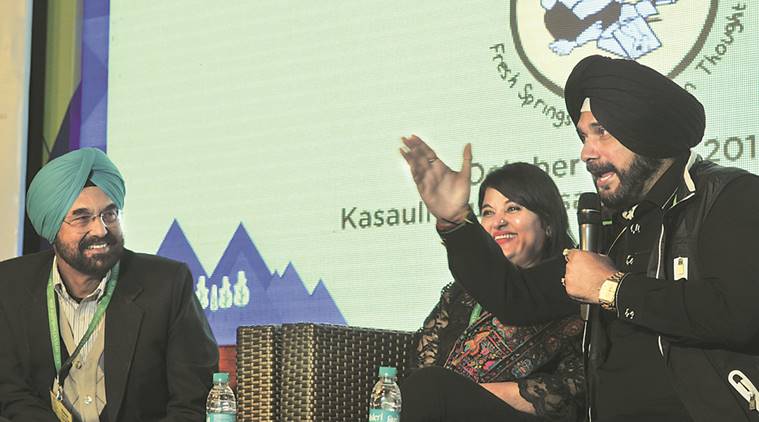 AAP MLA Kanwar Sandhu, writer Kishwar Desai and Punjab Minister Navjot Singh Sidhu at the Khuswant Singh Literature Festival in Kasauli on Friday. (Express)
AAP MLA Kanwar Sandhu, writer Kishwar Desai and Punjab Minister Navjot Singh Sidhu at the Khuswant Singh Literature Festival in Kasauli on Friday. (Express)
THE “PASSIONS, concerns and humour” of late writer Khushwant Singh, the underlining theme every year, took a backseat to usher in the #MeToo India movement as his eponymous literary festival began at the Kasauli Club on Friday.
The Khushwant Singh Literary Festival (KSLF) 2018 celebrates the author’s irreverence, but this year’s theme – Strength of a Naari – had more meaning in the backdrop of the movement that began on Twitter with women calling out sexual harassers in the creative field, prominent names among them being Union Minister MJ Akbar.
A majority of the sessions from the beginning to the end echoed MeToo as speakers such as author Gurcharan Das, mythologist Seema Anand, art historian Naman Ahuja, feminist writer Nivedita Menon, columnist Maja Daruwala, writer Anuja Chauhan and Punjab Local Bodies Minister Navjot Singh Sidhu, among others.
“Well, for me, as far as I am concerned, those who oppressed have to make way. And when I say that, words will not do it. It has to be implemented,” said Sidhu, who spoke at the closing session, Jallianwalla Bagh to Punjab, Punjabis and Punjabiyat, moderated by veteran journalist Kanwar Sandhu.
Sidhu talked about how Punjab Chief Minister Captain Amarinder Singh and he had ensured that 50 per cent tickets were for women in the 2017 Assembly election. “Even after that, there are husbands who want their wives to stay inside. Not just 50 per cent, it should be 51 per cent. The discrimination stems from our homes; girls study in girls’ schools and boys in boys,” he further stated, adding that to raise awareness on such issues, people need to take a step in their homes rather than the “MeToo, MeToo drama”.
“It’s just that your thought process should change. Agar srishti ko badalna hai toh drishti ko badalna hai (If you want to change the universe, change your vision). Unless the wrongdoers are punished, nothing will change. The fear of the law is missing. There are some norms in a civilised society and not even the king is above that,” said Sidhu.
Daruwala spoke on Women’s Rights are Human Rights, moderated by journalist-writer Prem Shankar Jha, while Chauhan joined child actor Aditi Inamdar and Matrena Martin, a beneficiary of actor Rahul Bose’s The Foundation, for a session on GenYouth Empowered, moderated by journalist Chander Suta Dogra. Daruwala said the way police treated women, things could not change for them because the police were controlled by politicians.
“Traditionally, women took protection from men and had to pay the price for insubordination. Women have had to repeatedly bite the dust as women can be beaten, harmed but still held as the bad guy,” she added.
“I don’t have too much sympathy for men right now. Women have been pushed too much and for too long, so this movement is like a slap on the face. But while we victims shame and blame, I want to say to all the women that I believe you. Now, it’s up to us to internalise it,” said Chauhan, who was here at the festival with daughter Nayantara.
“On campuses too, men are scared of the backlash. For the first time, it’s not us who have to be scared. Men are stopping to think for the first time,” said Nayantara, a student of political science at Ashoka University.
Even at Ahuja’s session on India and the World, moderated by Menon, there were references to MeToo as the speakers talked about the perception of women in ancient Indian art and tradition as being fluid as well as stifling.
Martin, a 24-year-old tribal woman from Nicobar, said, “I scroll down Facebook and see all these posts where women are talking about harrowing experiences. Men are almost intimidated by women now. It’s evident when you’re discriminated a lot, how will you speak your mind? If you have a group of people who don’t know about oppression, speaking out always helps.”
The opening session focused on Khushwant Singh with friends and family recalling his generosity as well as his originality. another report, page 3